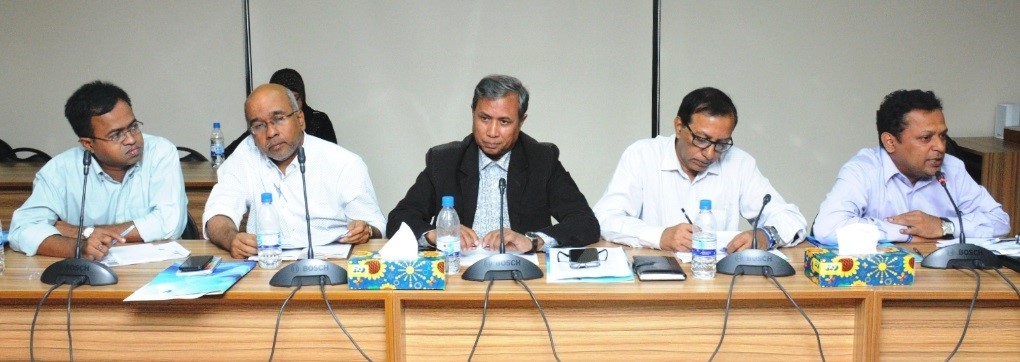Published: 02 March 2017
Local government organizations in the form of devoluted organization are more accountable compared to the delegated form of decentralization in Bangladesh. This was revealed in a study titled: “Democratic decentralization and promotion of accountability in urban development of Bangladesh: a study on Khulna City Corporation (KCC), Khulna Development Authority (KDA) and Jessore municipality” conducted by Dr. Md. Ashiq Ur Rahman under Transparency International Bangladesh (TIB) Fellowship programme for innovative research on corruption and governance. The writer, an Associate Professor of Urban and Rural Planning Discipline, Khulna University, Bangladesh, presented the findings during a roundtable held at Meghomala Conference room of TIB on 2nd March, 2017. Md. Iqbal Hussain, Secretary of KCC; Sultana Sajia, Town Planner of Jessore Municipality; Abu Sayed, Assistant Town Planner of KDA; Prof. AKM Abul Kalam, President Bangladesh Institute of Planners, attended the event among others and Executive Director of TIB moderated the session.
The success of decentralization highly depends upon the improvement of local government’s accountability. In respect to decentralization concept, accountability mainly involves with the relationships between the local governments and the central government as well as with their citizens. Though the decentralization process exists in Bangladesh, the accountability issue is a major challenge for urban development in Bangladesh. Therefore, this research was an attempt to identify the upward and downward accountability issues associated with urban development. In addition, it also identified whether there are any impacts of organizational arrangement of decentralization on the promotion of accountability issues in urban development practices of Bangladesh.
Adapting a mixed method research strategy, grey materials analysis, household questionnaire surveys, focus group discussions and key informant interview method were used for data collection. A sample of 218 respondents were carefully selected for two cities (Khulna and Jessore).
In terms of transparent and democratic decision-making process, the study identified that KCC which represents the organizational arrangement of devolution has few limitations. Devoluted organizations are created_at and strengthened financially or legally as sub national units of government and substantially outside the direct control of the central government. KCC did not allow any community participation in road construction and maintenance services as almost 95% respondents never participated in the process of constructing or maintaining local roads. Most of citizens participate at the local level decision making process through indirect mechanisms (89 percent), such as maintaining good network with ward councillors, local political leaders and City Corporation officials more often than through direct mechanisms, such as participation in public hearings, meetings and petitions.
In case of KDA, the scenario is very threatening as this organization is representing central government under the organizational arrangement of delegation and are more reluctant about citizens’ participation and perception. In Delegated organizations, managerial responsibility for specifically defined functions are transferred to organizations that are outside the regular bureaucratic structure and that are only indirectly controlled by the central government. Instead of having clear outline of three-tier participation of the public for decision-making, it is reported that only selected representatives from relevant public departments, professional groups, civil society organizations, business groups, media, political leaders and academics were consulted to determine the preliminary design of plan preparation process in KDA.The study found that 86.3 percent of the respondents are paying speed money to KDA officials, architectural firm or other agents outside of KDA for getting No Objection Certificate.
Jessore Municipality, the devoluted organization allows citizens’ participation in decision making process through Ward Level Coordination Committee (WLCC) and Town Level Coordination Committee (TLCC). Because of the strong presence of WLCC and TLCC, 74% respondents voluntarily participated in the process of constructing or maintaining local roads. Jessore municipality allow its citizens to take part in the local government events such as council meetings, public hearing, town level coordination meetings and municipal assembly.
The study identified that the above mentioned differences in KCC, KDA and Jessore municipality is happening because Local Government (Paurashava) Act, 2009 has specific recommendations for TLCC and WLCC but the Local Government (City Corporation) Act, 2009 lacks this provision. Therefore, the researcher recommended for amendment of the Local Government (City Corporation) Act, 2009 to make TLCC and WLCC mandatory for ensuring democratic decision making in KCC.
In addition, it suggested to develop communication strategies and iterative processes to: (i) inform citizens about local government policies, programs, services, and initiatives; (ii) more effectively listen to the public; and (iii) respond to citizens’ needs and incorporate their opinions into local government actions.
The research identified that, in KCC and KDA, no grievance redress mechanism is in place to accommodate the complaints, whereas the mechanism is functional in Jessore municipality. Institutionalization of a separate nodal section for receiving the grievances/ complains was recommended in the study.
Another problem found is institutional cooperation in case of formulating the physical development projects for local areas. There is no established legal mechanism by which communication among public authorities in Khulna city is possible to maintain. Jessore city has no problem regarding this, though it has dependency on central government. This study suggested to constitute a coordination board with representatives of different governments, civil society, private and community organizations.
The study also advocated for incorporation of civil society organization irrespective of the organizational arrangement of the local level organizations that are performing urban development activities.
The study concluded that upward accountability is not a problem in single form of decentralized organization. In terms of downward accountability, which relates to the ability of the organization to be accountable to citizens; there is still some room for maneuver to ensure active citizen participation. Jessore municipality justifies the aforementioned claim. However, in case of Khulna city, where two different form of decentralized organization exist, problem of upward and downward accountability prevails in a larger extent. Therefore, this study recommended for better coordination mechanism among KCC and KDA.
Appreciating the findings, experts suggested further research in this area as ‘smart city’ concept is now embedded in the SDG’s.
Full Report here









